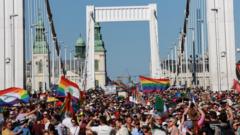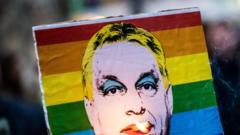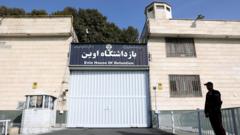In a powerful demonstration of solidarity, thousands gathered in Budapest on Saturday for the annual Pride event, turning the city's streets into vibrant celebrations of love and acceptance. The march came in the wake of Prime Minister Viktor Orban's attempt to ban the festivities, a move that invigorated participation, with attendees expressing defiance through colorful banners and festive attire.
Budapest Pride Thrives Amid Government Controversy

Budapest Pride Thrives Amid Government Controversy
Amid heightened tensions with the government, Budapest Pride attracted an estimated 100,000 to 200,000 revelers celebrating diversity and freedom.
The demonstration spanned the iconic Elisabeth Bridge, filling it with enthusiastic marchers for hours as they traveled from Pest to Buda. Many participants shared that Orban's recent policies against the LGBT community motivated them to join in. While last year saw only 35,000 attendees, the energy surrounding this year's event signaled a response to government repression, showcasing a peaceful yet powerful rebuttal to Orban's leadership over the past 15 years.
"While Pride is often seen as an LGBT event, today it represents universal human rights," said Finnish MEP Li Andersson, who participated in the march. Events unfolded under the shadow of a contentious new law that links discussions around homosexuality to child protection, which critics have described as a veiled attempt at censorship. Despite the police's initial ban on the march citing concerns for children's witnessing, the mayor of Budapest, Gergely Karacsony, successfully championed the event's legality, framing it as a fundamental right.
As the police maintained a low-key presence, there were indications of surveillance with cameras strategically placed around the event. Government officials, including Orban, focused on prioritizing 'family values,' trying to align their political narratives with community norms. Nevertheless, the day's occurrences indicated a rising tide of public dissent against governmental oppression.
"This demonstration is a manifestation of our rights," Karacsony declared to cheers from the crowd. The event turned into a joyful affirmation of freedom, signaling that despite the governing authority's threats, the spirit of Budapest remained unshaken and vibrant. Nevertheless, the future legality surrounding such events hangs in the balance, dependent on potential court rulings that could reshape the landscape of assembly rights in Hungary.
"While Pride is often seen as an LGBT event, today it represents universal human rights," said Finnish MEP Li Andersson, who participated in the march. Events unfolded under the shadow of a contentious new law that links discussions around homosexuality to child protection, which critics have described as a veiled attempt at censorship. Despite the police's initial ban on the march citing concerns for children's witnessing, the mayor of Budapest, Gergely Karacsony, successfully championed the event's legality, framing it as a fundamental right.
As the police maintained a low-key presence, there were indications of surveillance with cameras strategically placed around the event. Government officials, including Orban, focused on prioritizing 'family values,' trying to align their political narratives with community norms. Nevertheless, the day's occurrences indicated a rising tide of public dissent against governmental oppression.
"This demonstration is a manifestation of our rights," Karacsony declared to cheers from the crowd. The event turned into a joyful affirmation of freedom, signaling that despite the governing authority's threats, the spirit of Budapest remained unshaken and vibrant. Nevertheless, the future legality surrounding such events hangs in the balance, dependent on potential court rulings that could reshape the landscape of assembly rights in Hungary.



















